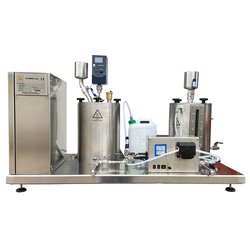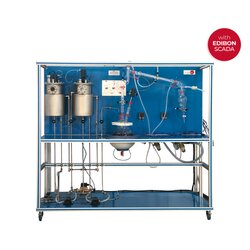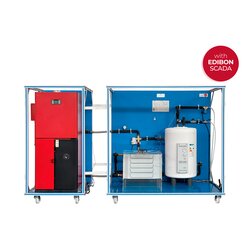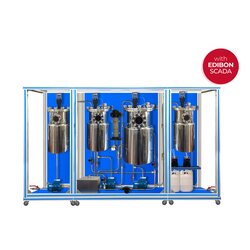Computer Controlled Biodiesel Process Unit (EBDC)
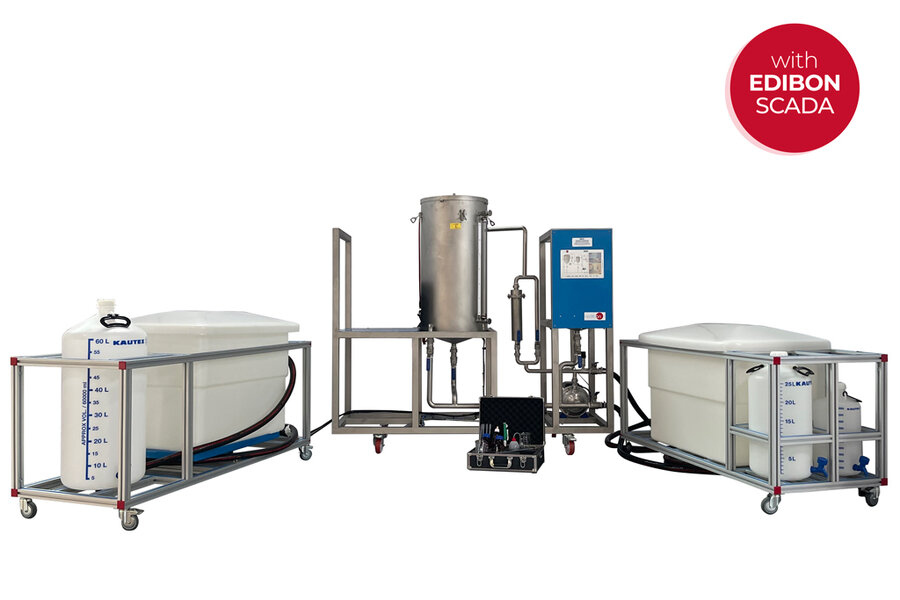

PL-527390
The Computer Controlled Biodiesel Process Unit, “EBDC,” performs the conversion of fatty acids from vegetable oils into a high-energy biofuel. This process is structured in two main stages:
- Stage I: Mixing and Reaction with Agitation. This first stage begins by introducing vegetable oil into the main reactor, while the catalyst is prepared separately in a smaller secondary reactor. The catalyst and reagent are then combined, and the mixture is subjected to intense agitation and consistent heating. This process is facilitated by a centrifugal pump for recirculation and an electric resistance heater, both of which are computer-controlled for precision. The stainless steel reactor is equipped with a temperature sensor and level switches, ensuring safe and accurate operation throughout the process.
- Stage II: Product Separation and Washing. After the reaction phase, the primary product (biodiesel) is separated from by-products. This is achieved through an initial biphasic decantation process, which is ideal for immiscible substances like biodiesel and glycerin. Due to its higher density, glycerin settles at the bottom and is extracted through the conical base of the reactor. The biodiesel is then directed to a washing stage, where it circulates through an ion exchange column to remove remaining impurities and water. Finally, the biodiesel is filtered through a diesel filter to ensure purity before being stored.
Additionally, the unit’s performance and biodiesel quality can be assessed using a load cell in the product tank and a titration kit, which includes a pipette and droppers.
The EBDC system is integrated with the EDIBON Computer Control System (SCADA), which provides the main unit, a Control Interface Box, a Data Acquisition Board, and software for process control, data acquisition, and data management to oversee each aspect of production.
- EBDC. Unit:
- Stainless steel frame and painted steel panels.
- The unit includes wheels for easy mobility.
- Main metallic elements made of stainless steel.
- Diagram on the front panel with similar distribution to that of the elements in the real unit.
- Circulation hose in specific polymer for fuels.
- Cellulose filter with ten micron pore size.
- Purification compartment with ion exchange resin.
- Computer controlled single-phase pump specific for diesel fuels:
- Reactor tank.
- Mixing tank.
- Oil tank.
- Methylate tank.
- Glycerin tank.
- Biodiesel tank.
- Instrumentation.
- Titration kit.
The complete unit includes as well:
- Advanced Real-Time SCADA.
- Open Control + Multicontrol + Real-Time Control.
- Specialized EDIBON Control Software based on LabVIEW.
- National Instruments Data Acquisition board.
- Calibration exercises, which are included, teach the user how to calibrate a sensor and the importance of checking the accuracy of the sensors before taking measurements.
- Projector and/or electronic whiteboard compatibility allows the unit to be explained and demonstrated to an entire class at one time.
- Capable of doing applied research, real industrial simulation, training courses, etc.
- Remote operation and control by the user and remote control for EDIBON technical support, are always included.
- Totally safe, utilizing 4 safety systems (Mechanical, Electrical, Electronic and Software).
- Designed and manufactured under several quality standards.
- Optional ICAI software to create, edit and carry out practical exercises, tests, exams, calculations, etc. Apart from monitoring user’s knowledge and progress reached.
- This unit has been designed for future expansion and integration. A common expansion is the EDIBON Scada-Net (ESN) System which enables multiple students to simultaneously operate many units in a network.
- EBDC/CIB. Control Interface Box
- EBDC/CCSOF. PID Computer Control + Data Acquisition + Data Management Software
- Cables and Accessories, for normal operation.
- Manuals: This unit is supplied with 8 manuals: Required services, Assembly and Installation, Interface and Control Software, Starting-up, Safety, Maintenance, Calibration and Practices manuals.
EXERCISES AND PRACTICAL POSSIBILITIES TO BE DONE WITH THE MAIN ITEMS
- Study and performance of tests to determine the appropriate amount of catalyst to be used in the biodiesel generation process (titration).
- Familiarization with the operation of a biodiesel production unit during the products reaction, extraction and washing process.
- Study of the agitation and mixing level influence on the final quality of the obtained biodiesel.
- Study of the washing and purifying stage influence on the final quality of the obtained biodiesel.
- Study of the influence of temperature during the vegetable oils preheating and reaction stage on the final quality of the obtained biodiesel.
- Analysis and tests to determine the biodiesel quality
What is this?
These percentage scores are an average of 0 user reviews. To get more into detail, see each review and comments as per below
If you have used this product, support the community by submitting your review
